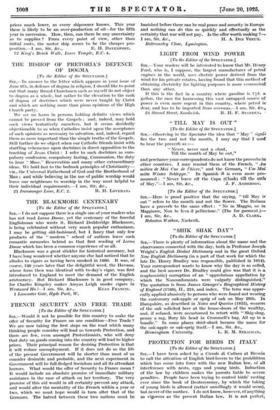MOTOR SHIPS VERSUS STEAMSHIPS
[To the Editor of the SPECTATOR.]
SIR,—May I be permitted to add a few words on the con- troversy which great authorities are waging over the motor ship ? We hear, on the one hand, that the motor ship will drive the steamship from the high seas before we arc much older, and, on the other, that the limit of power reached by motor engines is much below that of steam engines, and that the efficiency of the steamship has not yet attained its zenith. On the technical points we may leave the engineers to fight the battle out among themselves, but on the economic points an economist may perhaps be allowed to speak with no less authority than a shipowner. Granted that the first cost of a motor ship is higher than that of a steamship (the first cost of any new invention is high, but it becomes less as parts become standardized), yet there is an economy of perhaps 25 per cent. to 30 per cent. in running costs, there is greater capacity for cargo and passengers, there is a wider radius of voyage without bunkering, and there is a higher economic speed. The fuel consumed by a motor ship is less than half the fuel consumed by an oil-burning ship and a fifth that consumed by a coal- burning ship. We read of shipowners (pace Lord Kylsant) complaining that the uncertainty of obtaining oil supplies, and at reasonable cost, is holding back the motor ship ; but who ever met a shipowner who did not think that he was
paying too much for his fuel, whether it be coal or oil ? As one who has studied for some years the price of oil fuel, I can say that rarely has fuel oil been so cheap or so plentiful as at the present time. In 1920 the spot price of Diesel oil was £16 5s. per ton ex tank. It fell to £4 per ton in 1922, when slump conditions were ruling, and after some fluctua- tions it is now £4 17s. 6d. per ton, with forward contract prices much lower, as every shipowner knows. This year there is likely to be an over-production of oil—for the fifth year in succession. How, then, can there be any uncertainty as to supplies ? From every point of view, other than initial costs, the motor ship seems to be the cheaper pro-











































 Previous page
Previous page